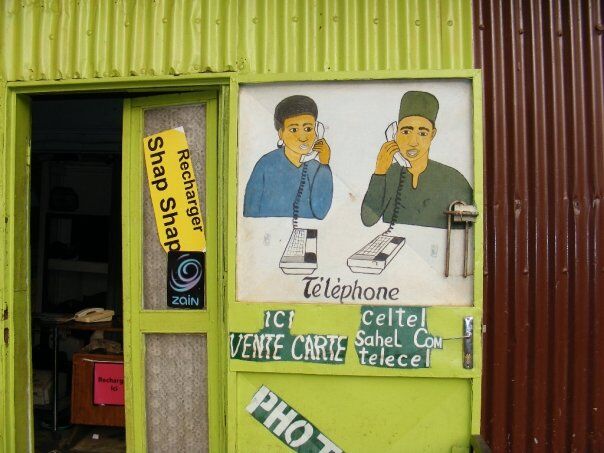Friends
Finding Well-Being When Dealing With Immobility
How the challenges of immobility can deepen our social sensitivity.
Posted April 11, 2022 Reviewed by Michelle Quirk
Key points
- Immobility is a humbling experience that deepens an appreciation for the simple joys of the human condition.
- In an aging US population, physical impairment, the most common form of disability, is widespread.
- The practical wisdom of West African elders provides one effective way to live with physical impairment.
During my last trip to the Republic of Niger, I had the privilege of staying at Le Grand Hotel, a venerable structure in Niger's capital, Niamey. Unlike most of the hotel guests who would go to town in cars or taxis, I preferred to walk. Walking has always been one of the great pleasures of my life.
Every morning when I left the hotel grounds, I would encounter a young woman seated on a hand-propelled tricycle. She always gave me a warm smile and a cheery greeting. During our conversations, she told me that, as a child, she had been stricken with polio and that she lived with others who, like her, were physically disabled. She said her name was Ramatou and that she was 18 years old. She and her comrades would show up at places like Le Grand Hotel in search of donations. During my stay, I gave her money for lunch and tried to understand the difficulties—poverty and disability—she had to confront at such a young age. At the same time, I wondered how she could appear to be content and cheerful. How did Ramatou confront her disability with so much grace and dignity?

Since that visit, I have thought a good deal about how Ramatou and her friends patiently managed to negotiate their physically impaired lives in such challenging circumstances.
Value of Patience
Living conditions in Niger require no small amount of patience. Patience became my friend during a 17-year apprenticeship to wise West African healers. Learning to be more patient was one of the lessons they taught me. In our contemporary culture of speed, it has become increasingly difficult to be patient. But sometimes circumstances force one to slow down. Patience was a valued companion during my journey on cancer’s path. Conditions required that I patiently endure cancer diagnosis, treatment, and remission, which has meant that I continue to live in the uncertain space between heath and illness, life and death.
Unlike Ramatou and her friends who managed to get around Niger's capital on hand-driven tricycles, cancer treatment and the vicissitudes of remission have not impacted my mobility. Despite my medical history, I have always had the luxury of exercising at the gym, cycling for long distances, and hiking in the woods. For 15 years, I walked my dog, Gogal, a 55-pound mixed black lab, twice a day. On most of our outings, we’d follow a three-mile route through the neighborhood and a woodsy state park. Toward the end of his life, Gogal developed arthritis. Our walks became shorter. Sometimes his hind legs would give out and he’d fall. Immobilized, this once-energetic dog could no longer negotiate the stairs to the second floor of our house. During his last months, I had to carry him up and down a series of seven brick steps that led to the sidewalk. In the process, Gogal would sometimes struggle. One day, we fell on the steps, and I injured my back. In that moment, my life changed.

My Experience With Immobility
For the first time in my life, I had difficulty walking—even short distances. On two occasions, my legs buckled, and I fell. People offered to help me. I felt grateful, but found it difficult to accept my newfound fear of walking. I didn’t want to be a burden—to anyone.
For support, I bought several canes. And, so, I entered the world of immobility. When strangers saw me walking on the sidewalk or in a store, they responded to me in a different manner. They’d hold the door for me. They'd make sure to steer clear of me in a corridor—to avoid a potential bump that could result in further injury. I began to appreciate previously unnoticed ramps, railings, elevators, and automatic doors. I applied for a temporary handicapped parking placard and began physical therapy. Medical screenings suggested that my condition would be temporary—no broken bones or lesions had been detected. Even so, becoming more mobile was going to be painfully slow.
Immobility changed my world. Small tasks like going to a restaurant seemed like a triumph. Traveling to my office to teach a seminar, something I’d routinely take for granted, now became a physical challenge. In short, even temporary immobility creates, at in least in my experience of it, a sense of fearful vulnerability. It has also given me a deep appreciation for the courage of permanently impaired people, most of whom somehow confront their challenges with measures of grace.
In my brief experience of immobility, I've discovered that those who are disabled are marginalized. We see the walkers and wheelchairs, but we don't want to think about what it's like to walk with a cane or move about on a hand-driven tricycle. Even so, disability is commonplace. In a 2018 report, the Centers for Disease Control and Prevention (CDC) reported that one in four US adults live with a disability, a percentage that, according to the CDC, continued to hold in 2021. Older adults, according the CDC, are more likely to have mobility issues, which is the most common form of disability. For American adults over 65, roughly two in five will experience some form of disability.
But what do we know of those who struggle to walk 200 feet, of those confined to a wheelchair or a hand-driven tricycle? What can they teach us about finding a path to well-being? I cannot speak for the millions of people, old and young, who must confront some form of disability each and every day. From the vantage of my current state of immobility, I can say that I will no longer take for granted something as fundamental as personal mobility.
These thoughts bring me back to Ramatou's warm smile. They also remind me once again of how much my West African mentors valued patience. If you are patient, they liked to tell me, your path will lead you to place where you can accept the limits life presents and live robustly within them. As we age, that is a path well worth following.
References
Frank, Gelya. 2000 Venus on Wheels: Two Decades of Dialogue on Disability, Biography, and Being Female. Berkeley: University of California Press
CDC 2018 1 in 4 adults live with a disability. http://www.cdc.gov/disabilities.
Murphy, Robert 1987. The Body Silent: The Different World of the Disabled. New York: W.W. Norton.


